Summer is finally here! And that means sun, fun, and temptation. Next to Christmas, the summer seems to be the hardest time for me to stick to my diet. There are BBQs, parties, and weddings; oh my! I take the occasional day off, usually for a wedding, but I can’t do it every time there is an event…or every time I walk by the delicious ice cream place around the corner from our house that is way more generous with their scoops than any place I’ve ever seen (a small is two massive scoops 😍).
To help deal with those cravings, there are some great substitutes I go to for all those summer favourites like chips, burgers, and popsicles. Let’s get to it!
1. Ice cream
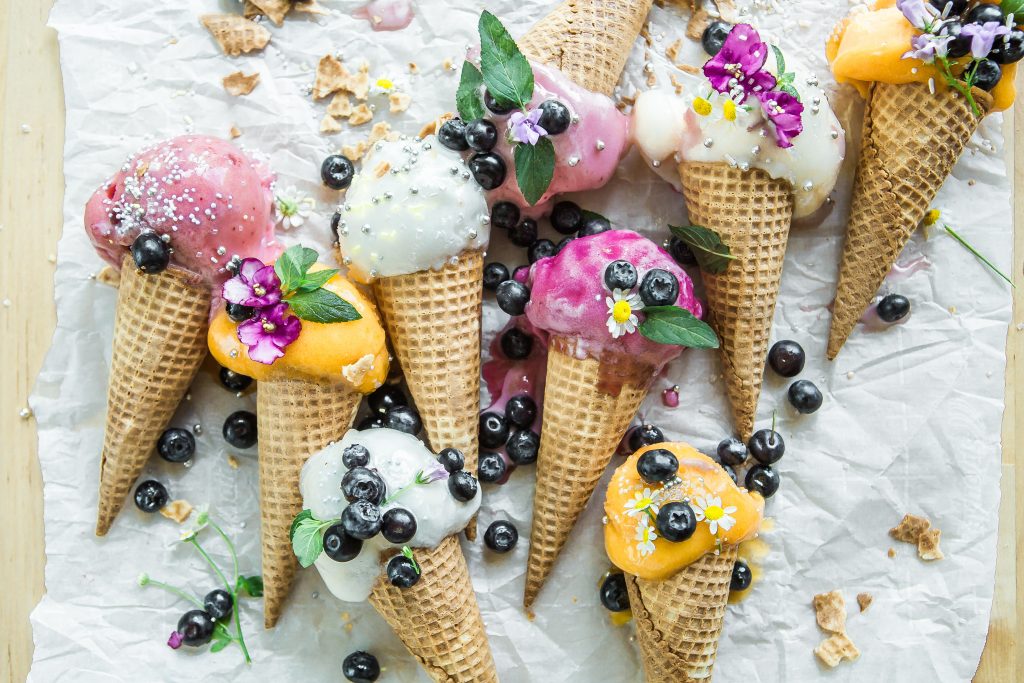
This is probably the most popular summer treat there is! Cool, creamy, and devilishly sweet, ice cream is the perfect way to beat the heat when your sweet tooth kicks in on a hot day. But what to do when you are trying not to eat both dairy and sugar? That’s basically all ice cream is. Dang.
There are a number of options in the grocery store, from soy and rice milk ice cream to lactose-free dairy ice cream. The problem with lactose-free ice cream is that it still contains casein and whey. There is debate over whey and it’s risks, but things are more clear cut when it comes to casein, it having been identified as carcinogenic to humans and potentially the most relevant promoter of cancer growth due to how much dairy the North American population consumes. I avoid both just to be safe. And the issue with many of the dairy-free ice cream choices is that they have either sugar or artificial sweeteners, which are promoters of inflammation and can seriously harm your friendly gut bugs.
But fear not! There is a way to satisfy that calling for cream and sugar without all the, well, cream and sugar. The best ice cream substitute I have found is by Screamin’ Brothers. It contains only a few ingredients (and you can pronounce them all!): organic coconut milk, honey, and then whatever natural flavour. They have a multitude of delicious options as well, from lemon and blackberry to chocolate banana and classic vanilla. The best place to get it is at Nature’s Emporium (the closest one to Hamilton is in Burlington), but they usually have the basic flavours at Fortinos and similar stores in the health food section.
2. Potato Chips
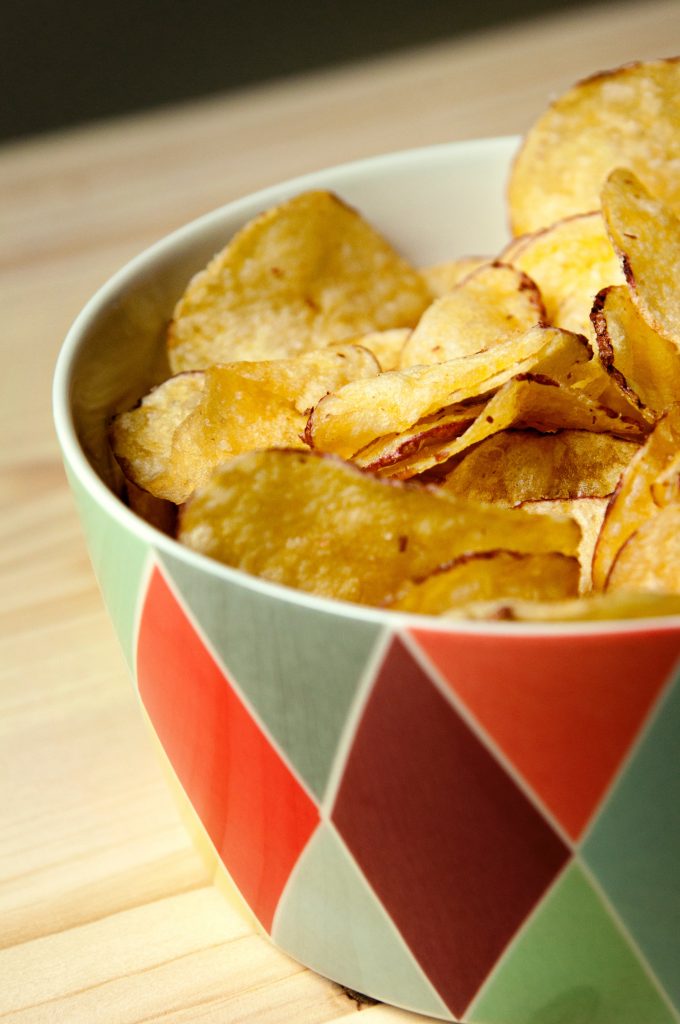
A classic at BBQs and pool parties, there is nothing better when you are craving a salty snack than potato chips. And there is an argument to be made for a potato being a fibre-rich root vegetable, if you eat the skin too. As a white starch, potatoes do however cause quite a blood sugar spike, and that’s something you want to avoid if you are treating or preventing cancer.
The easiest swap out are sweet potato chips instead. Sweet potatoes have a lower glycemic index than most other potatoes, meaning that they don’t cause as much of a spike in blood sugar levels. Terra chips make a delicious sweet potato chip as well as a mixed root vegetable option as well. Both are delicious and a healthier choice than the classic potato chip.
Another favourite substitute of mine is Beanfields bean chips. These are great because they have a decent amount of protein and fibre, both of which help to mitigate blood sugar spikes caused by simple sugars. It is important to note that some of their flavours have sugar in them, so be sure to read the label. My favourite sugar-free flavour is pico de gallo.
3. Burgers
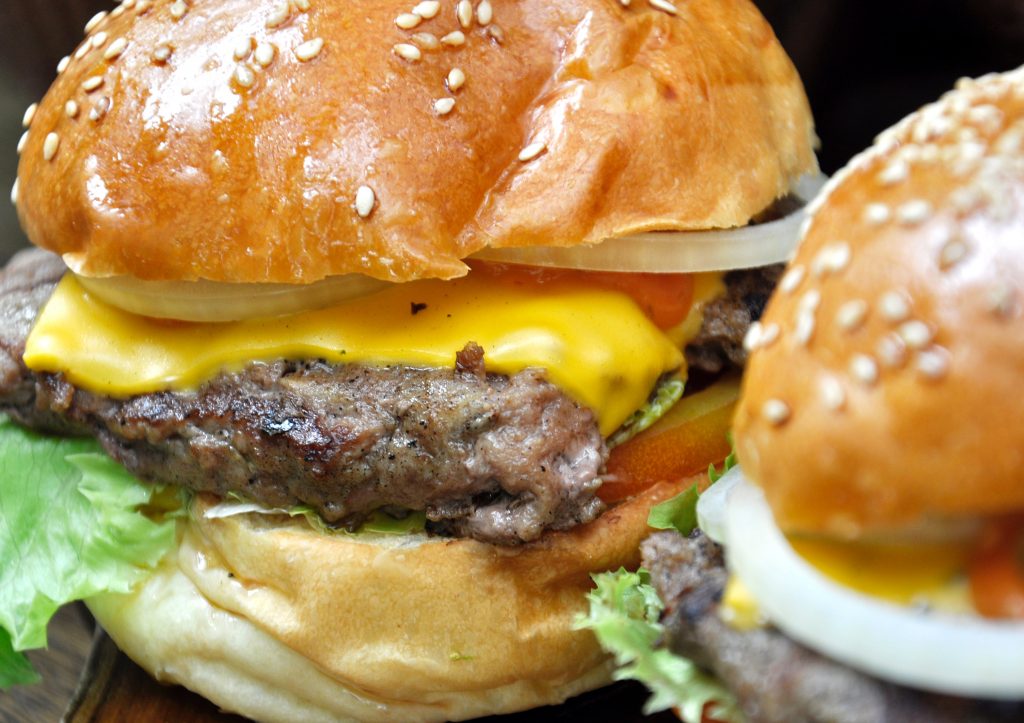
Is there anything more quintessentially summertime than a BBQ burger? The smell alone is enough to bring me back to neighbourhood pool parties as a kid. There are some reasons that you may want to avoid beef however. Most commercial beef is fed a grain-heavy diet and has skewed omega 6 to omega 3 ratios, meaning they have much higher levels of omega 6 fatty acids, which cause a lot of inflammation both in the animals and in the humans who eat them. Commercially raised animal products also contain high levels of hormones and antibiotics, and consumption of them can lead to increased levels of IGF-1, all things you want to avoid.
If you choose to include meat in your diet, it is extremely important that you exercise regularly to help maintain healthy levels of IGF-1 and that you choose organic meat to avoid the extra hormones and antibiotics. If possible, it is also ideal to get grass-fed meat as well; animals fed diets made up of primarily grass have appropriate omega 6:3 ratios and, therefore, cause less inflammation.
If you choose not to eat red meat, there are some fantastic plant-based burger recipes out there, one of which I have posted in the Solis Facebook group. If you aren’t up for making your own, the most delicious substitute is the Beyond Meat burger. Made primarily from bean protein, this burger is completely gluten and soy free. There is much debate over soy and hormone-driven cancers. For me, I do include it in my diet because of more research and professionals coming out in support of soy for hormone positive breast cancer (you can read more about it in my blog post here), but there are many people for whom it does cause issues and who do choose to avoid it. The Beyond Meat burger tastes and feels exactly like the classic BBQ beef burger, so much so that some vegetarians and vegans say they can’t eat it because it reminds them too much of meat! There are different brands now that have similar products and it doesn’t really matter which one you go with. The only thing to keep in mind is that they do use refined vegetable oils like canola or safflower, which aren’t great for your gut microbiome, so you want to limit how much you eat these. The occasional one at a BBQ though is no big deal. Also, it’s best to have it on a bed of lettuce or wrapped in a collard green leaf to avoid the gluten and carbs of a bun.
4. Popsicles
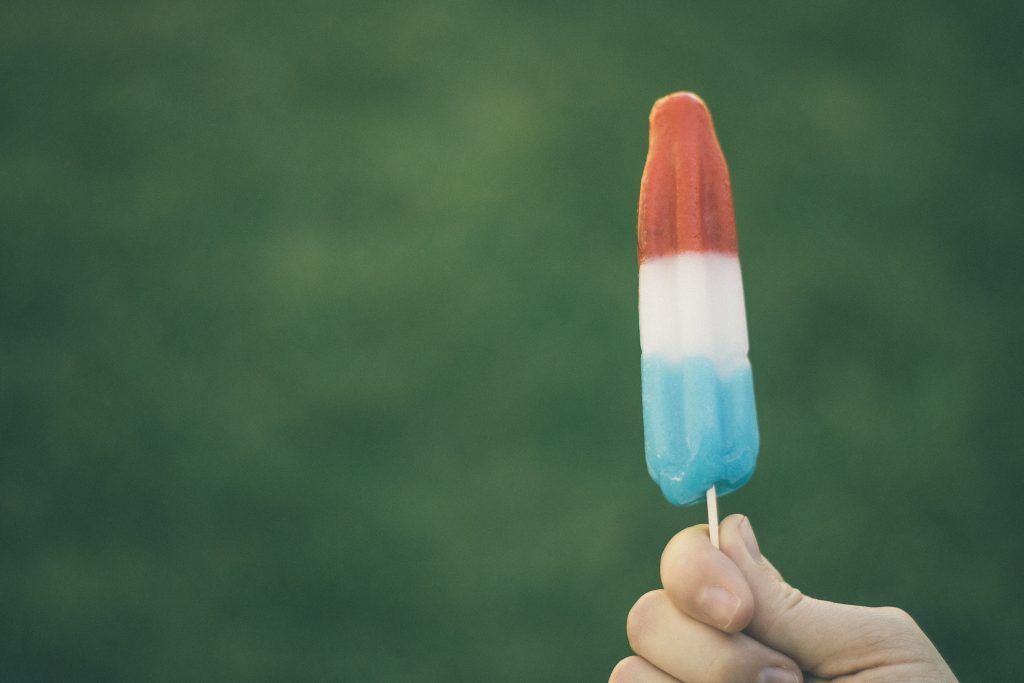
I still remember the joy of slamming a popsicle against a sharp edge to break it in two; it felt like I earned the treat when I could get it to break right down the middle without accidentally breaking the top off. This treat is so nostalgic for so many people; unfortunately, it’s also laden with sugar and artificial colours.
Sugar causes blood sugar spikes, which we discussed above. It also causes inflammation in your body, which is something you absolutely have to minimize if you are treating or wishing to prevent cancer. Cancer thrives in inflamed environments, and although more research is needed, in the long term, inflammation from sugar may damage DNA and cells. Artificial colours have been linked to DNA damage and certain forms of cancer in mice studies, and while human trials have been mixed, there are many advocacy groups that recommend avoiding them, and I definitely don’t want to risk it.
My favourite popsicle replacement is frozen fruit. Berries and grapes are best for the lower sugar content of berries and the rich levels of cell- and DNA-protecting antioxidants in both. Grapes have been found to also have anti-tumour effects and a positive effect on a number of other conditions, while berries have been found to attenuate inflammation, inhibit angiogenesis (the formation of blood vessels that feed tumours) and affect apoptosis (programmed cell death) and proliferation rates of malignant cells.
If that isn’t quite doing it for you, something a little closer to the real thing are DeeBee’s Organic Superfruit Freezies and Fruit Pops. They are made from organic fruit juice, and they contain no added sugar or artificial colours, flavours, or sweeteners. You can find them most readily at Nature’s Emporium, during the summer at many regular grocery stores, and online at well.ca. So delicious, and a much healthier way to beat the heat!
5. Beer
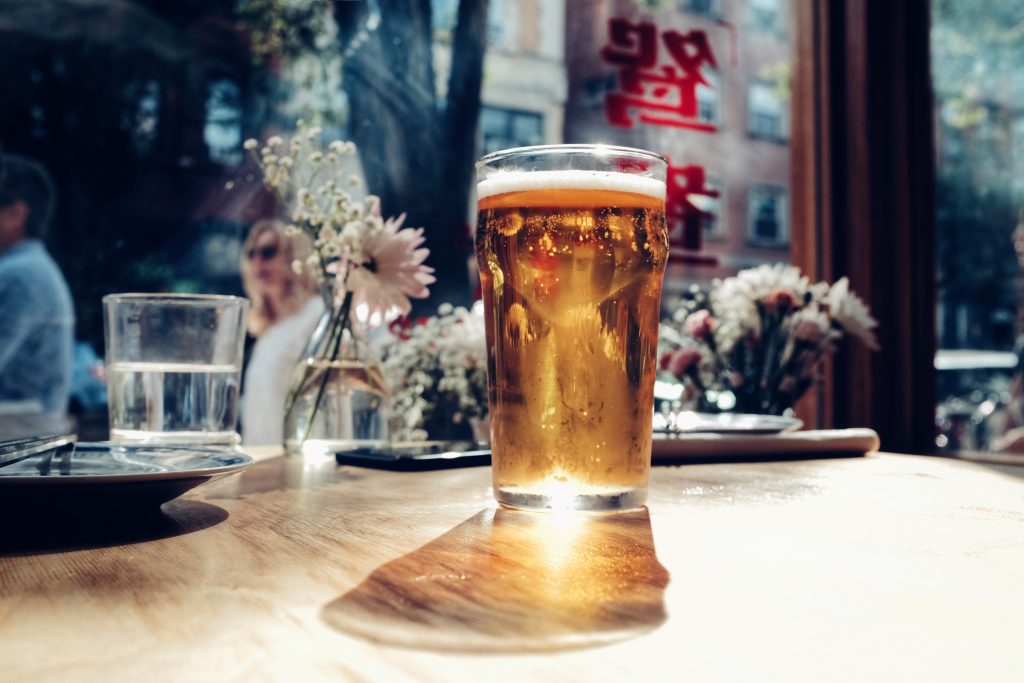
Oh my sweet, sweet beer; how I miss thee. Beer was my go-to alcoholic bevvy of choice in the before-times, and when I have a cheat day I almost always include a frosty brew. There is nothing quite like a cold beer on a hot, summer patio, and it’s something I dearly miss.
Although I indulge occasionally, alcohol is not something I choose to consume on a regular basis anymore. There is much debate over alcohol, mostly because people just don’t want to give it up. There is something to be said for the stress relief, relaxation, and social elements associated with drinking, and these may outweigh the potential risks for you. That is completely your call; no judgements here. But as always, do your research and then base your decision on what you learn and what your gut is telling you.
Alcohol is often made from plants that are xenoestrogens (they contain compounds that act like estrogen in your body and contribute to what can be a dangerous estrogen dominance in your body, at its worst leading to hormone driven cancers). And this is not just a problem for women; it is growing increasingly common for men to also suffer from estrogen dominance, which can lead to a whole host of health problems. Not only does alcohol contribute to estrogen dominance by acting like estrogen in your body, but it also makes it more difficult for your body to metabolize it’s naturally produced estrogen (in men too), and you can see how this would further contribute to a hormone imbalance in your body. If you would like to learn more, this is an easy-to-understand article about xenoestrogens and why they are so dangerous.
Alcohol also contains a compound called acetaldehyde, and you can thank it for any hangovers you have experienced in your life. When your body has too much acetaldehyde to deal with and can’t break it down properly, it builds up in your cells where it can damage your DNA and gene causes mutations. If the mutation is more serious, it can lead to a disruption in the instructions to your cells; they don’t get the message to stop replicating and they don’t get the directive to die. Those damaged cells float around, find a nice cozy home in your breast or your prostate or your liver, and they start replicating, without stopping and without dying. Eventually, those cells amass into a tumour and we call it cancer. If you are interested in learning more about DNA damage and cancer, this article is a great place to start.
It is always my recommendation that people limit their intake of alcohol if they are wishing to prevent a recurrence or a diagnosis in the first place, and I highly recommend anyone actively healing from cancer eliminate it all together until they reach a stable place with their health. But, this is entirely your call, so do some reading and make an informed decision that feels right to YOU. For those who do decide to limit or eliminate alcohol, I love kombucha as a replacement. You can make your own pretty easily (I did a whole post about it, which you can read here), but there are also lots of delicious brands that you can find in the health food section of most grocery stores. Kombucha does have sugar, but they add it to feed the bacteria and cause the fermentation that is so, so good for your gut microbiome; most of it gets eaten by the bacteria during the fermentation process, and much of the sugar content in kombucha comes from the things they add to it for flavour, like fruit juice. Kombucha is deliciously fizzy and so good served chilled, satisfying those same sensations you get from beer. Due to it being a fermented beverage, you are supporting the health of your gut buddies, and test tube studies have shown that kombucha even helps to prevent the growth and spread of cancerous cells because of the high concentrations of tea polyphenols and antioxidants.
Armed with this list of healthy summer substitutes, you will hopefully find it much easier to resist the temptations that come with summer.
Happy Healing ❤️
References
https://nutritionstudies.org/casein-consumption/
https://aor.ca/whey-protein-and-cancer-friend-or-foe/
https://www.healthline.com/nutrition/sugar-and-inflammation
https://www.sciencedaily.com/releases/2018/10/181001101932.htm
https://www.verywellfit.com/why-do-potatoes-raise-blood-glucose-more-than-sugar-2242317
https://www.oncologynutrition.org/erfc/healthy-nutrition-now/sugar-and-cancer
https://chriskresser.com/how-too-much-omega-6-and-not-enough-omega-3-is-making-us-sick/
https://www.vivahealth.org.uk/veganhealth/dont-feed-cancer/igf-1-diet-and-cancer
https://www.ncbi.nlm.nih.gov/pubmed/22701472
https://www.livestrong.com/article/457555-the-side-effects-of-artificial-colors/
https://www.ncbi.nlm.nih.gov/pmc/articles/PMC4553113/
https://www.ncbi.nlm.nih.gov/pmc/articles/PMC5187535/
https://elevays.com/truth-xenoestrogens-estrogen-dominance/
https://www.cancerresearchuk.org/about-cancer/what-is-cancer/genes-dna-and-cancer
https://www.healthline.com/nutrition/8-benefits-of-kombucha-tea#section7




0 Comments